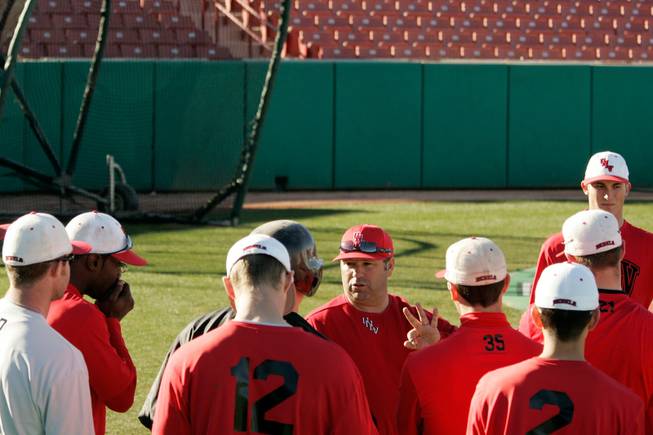
UNLV baseball head coach Buddy Gouldsmith, center, gives his team some pointers Tuesday at the Earl E. Wilson baseball stadium on campus. He says none of his players has tested positive for steroids.
Friday, Feb. 8, 2008 | 2 a.m.
Beyond the Sun
On the same day former major leaguer Chuck Knoblauch appeared on Capitol Hill in Washington to meet with lawyers from a House subcommittee investigating the use of performance-enhancing drugs in baseball, Buddy Gouldsmith stood along the first-base line at Earl E. Wilson Stadium and watched his UNLV baseball team prepare for its first practice of the season.
Although Gouldsmith had no personal stake in Knoblauch’s private testimony Feb. 1 — or in next week’s House Oversight and Government Reform Committee’s public hearing on the issue — the subject of steroids isn’t ever very far from Gouldsmith’s mind. The Rebels’ fifth-year head coach and his coaching staff routinely talk with their players in an attempt to steer them from using illegal performance-enhancing drugs.
“I definitely think the pressure is there — and that’s unfortunate, that it’s crept that far down where (some college players) are feeling an inherent pressure to be bigger, faster and stronger and feel like there’s a shortcut to becoming bigger, faster and stronger,” Gouldsmith said.
UNLV conducts random testing for performance-enhancing drugs on student-athletes, as part of an NCAA program for Division I schools, and Gouldsmith said no UNLV baseball players have tested positive while he has been there. But because of the relatively small number of student-athletes tested, he did not rule out the possibility that “there is somebody who has run through our program who has tried it.”
“I’m not naive,” he added. “But lucky for me, it’s never been something that’s come up or been so self-evident that you’ve had to address it. But I definitely think the pressure is there.”
Gouldsmith also believes the players who have come through his program, for the most part, tend to place a high priority on their education and make better decisions as a result.
“You have people who are committed to education and if you’re committed to education, then you’re committed to evaluating your decisions somewhat comprehensively so that you’re taking into consideration all the ramifications of your decision,” he said.
The more than 80 major league players identified in the Mitchell Report as having used performance-enhancing drugs, Gouldsmith said, probably were concerned only with whether the drugs would make them bigger and better and would help them in the short run.
Gouldsmith said he tries to educate his players on the long-term consequences of steroid use, including the increased risk of certain types of cancer, hardening of the joints and other maladies that are just now coming to light.
“From an education standpoint, the one thing (we stress is) there are no shortcuts to success and, right, wrong or indifferent, that’s a shortcut and it will catch up to you,” he said of using performance-enhancing drugs. “The one thing we try to get across to them and educate them about is the long-term effects ... and you’re starting to see some effects of that over the long haul and the wear and tear that it takes on guys.
“That’s important for our guys to see so that it does deter them in some fashion from taking that route.”


Join the Discussion:
Check this out for a full explanation of our conversion to the LiveFyre commenting system and instructions on how to sign up for an account.
Full comments policy